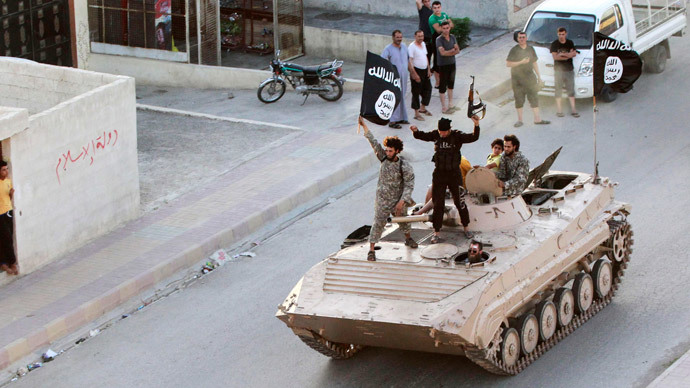‘Total rethink of countering terrorist financing needed in case of ISIS’

ISIS seems to know how counter-terrorism laws work as it uses a special regime of funding to avoid being reported, Christine Duhaime, a lawyer specializing in countering terrorism finance told RT.
RT:Yousaf Al Salafi, who is believed to be an ISIS leader in Pakistan, reportedly confessed to Pakistani law enforcement that he gets money routed though the US. How difficult will it be to identify the source of the funding?
Christine Duhaime: Well, it sounds like al Salafi’s claims that he received lots of funds from many different sources for each of the recruits that he sent over, $600 for each one. And we don’t really know how many people are involved, so that small amount of money would be rather difficult to trace if there are lots of people involved, although if it’s a specific country that’s been targeted, like money from the US to Pakistan, it wouldn’t be that difficult. But it sounds like its minute enough amounts that are not necessary going to be triggered in the counter-terrorist regime that we have set up with the banks and other financial institutions to track.
READ MORE: Islamic State operative confesses to receiving funding through US – report
RT:So you imagine it is difficult to trace it?
CD: I would think so, yes. Because it’s a small amount of money, $600 per recruit, coming routed through the US. So it sounds like it actually originated somewhere else and in some way, or shape, or form was routed through the US to Pakistan. So that’s a bit of a circuitous route that I think it would be rather difficult to trace as a matter of course. Because the amount of money is small so it doesn’t necessarily trigger reporting requirements through our net, through our banking system to be caught in counter-terrorism financing, for example.

RT:How much basis is there in the Western world for legal action over this - and can the alleged sponsors of terrorism be brought to justice?
CD: Generally speaking we have our counter-terrorism financing laws and that requires that when a there are large transactions or suspicious transactions that we know might be connected to terrorist financing, then financial institutions - mostly our banks and our money services businesses - report that activity to the Federal government and then the Federal government investigates and finds terrorist connections and stop the financing from occurring and undertake prosecutions. So that’s the normal route that is supposed to happen. But ISIS is funded in a totally different way, at least initially. So it’s hard to take that regime that we are supposed to stop somethinglike ISIS from even getting power and having the amount of money it has now.. it’s hard to take that sort of regime that was set up to stop because it hasn’t really worked.. to now tackle something like ISIS at work…It’s being funded in a completely different way now that isn’t entirely through our modern financial system. So we have to have a total rethink on how we tackle terrorist-financing when it comes to organizations like ISIS.
RT:Do ISIS deliberately avoid detection?
CD: I do think so. My sense from ISIS is they seem to be well aware of how anti-money laundering and counter-terrorism laws work. And I think that they organize their regime on purpose to avoid the systematic financial reporting that we have in our whole financial system. And a lot of them have actually said - for example some of their conversations on Twitter when they ask for money and on ask.fm and on those platforms that they use around the world - they specifically ask people to use funding that does not use the modern financial transactional system. So I suspect that the amounts are going to be low for this type of a thing in order to avoid being reported. But of course this is an organization that has reportedly $2 billion at its disposal so $600 here is not a significant amount to them for anything really.
RT:Is it embarrassing for the US government in any way?
CD: No, I don’t think so. I think that what al Salafi said, that the money was routed through the US, he didn’t say it originated. So I don’t think that there is necessarily a concern with the fact that there are organizations here that are raising funds, although that could be a possibility. So what he has said really is a routing mechanism that could be anything from Western Union to just a corresponding bank being used. I don’t think there is enough information at the moment to be embarrassing to the US really. I mean in our modern banking system money flows through many different channels, many different countries, many different vehicles, you know any international scheme of things. So the fact that is routed from one country isn’t really an embarrassment per se. It’s just the way the financial industry works.
The statements, views and opinions expressed in this column are solely those of the author and do not necessarily represent those of RT.
The statements, views and opinions expressed in this column are solely those of the author and do not necessarily represent those of RT.












